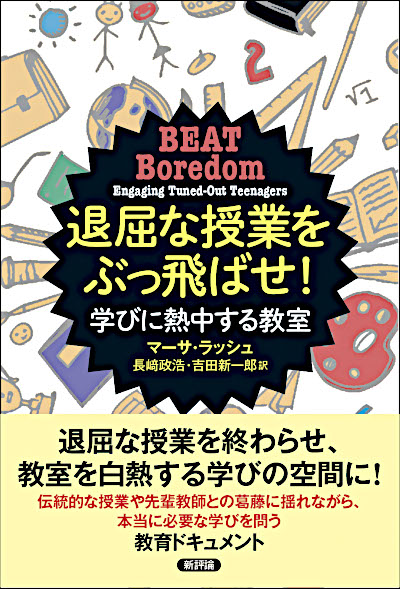“Workshop is a period of discussion or practical work on a particular subject in which a group of people learn about the subject by sharing their knowledge or experience. “
今年は、いくつかの授業でworkshopを取り入れている。以前から、強く関心をもっていたのだが、昨年から数名の先生方と共同研究を始めたのがきっかけとなった。なぜ、関心をもってきたかというと、教師から、知識を与えることが主目的の、従来型の一斉授業に限界を感じ続けてきたからだった。しかし、日本の教育にどっぷりつかってしまうと、有無も言わさず、わき目もふらさず、人を出し抜いてでも、より多くの知識を獲得させようと努めてしまうのだ。「自ら選んで学ばせる。クラスの仲間とともに学ぶ。」などという方法は、生ぬるい、悪しき自由主義と批判されるのが落ちだ。生徒の学びをコントールし、意欲を管理し、思考を単一にして(豊かな解釈よりも「正解」)、しっかりと結果を残すことが教師の力量なのだ。
だが、これが崩壊しはじめている。佐藤学氏の言う「学びからの逃走」だ。これに対する解決策の一つが、workshop型授業にあると考えている。それを探究するのが今の取組である。
アメリカで、workshop型の授業を実践しているNancie Atwell(1998)の"In the Middle"から、いくつか引用を掲載する。
・「教師の読み」の押し付けから「生徒自身の読み」へ
“They (Students) were passive recipients of literature I selected and interpretations I devised.” (p.33)
・学びにおける「選択」の意味
“Allowing readers to select their own books has a major impact on students’ fluency, reading rate, and comprehension.” (p.37)
・思春期の学び
“Surviving adolescence is no small matter; neither is surviving adolescents. It's a hard age to be and to teach. The worst things that ever happened to anybody happen every day. But some of the best things can happen, too, and they're more likely to happen when middle school teachers understand the nature of middle school kids and teach in ways that help them grow.”(p.p.53-54)
“We won’t get the best from middle school students until we stop blaming adolescents for their adolescent behavior and begin to invite their distinctive brand of middle school best. I think we make the best of adolescence when we recognize and act on three principles.
First, teachers have to accept the reality of middle school students,…(略)
Next, we have to recognize that adolescence is as special and important a time in students’ intellectual development….(略)
Finally, middle school teaching should be organized so that it helps kids begin to understand and participate in adult reality. This means more independent activity, more say in what happens in the classroom, and more responsibility for their learning. It also means teachers who communicate the importance and usefulness in our own lives of the subjects we teach, who demonstrate our processes as learners and our personal knowledge of our fields, and who invite students inside academia by showing them that inside is a worthwhile, interesting place to be.” (p.54)
・習熟度別学習の問題
“Tracking(=separating children into different classes according to their academic ability ) exists mostly for the benefit of teachers and the lecture/listen/busywork mode of instruction. It allows schools to blame students for failing to teach them well--all those low-tracked adolescents of whom less and less is asked or expected.” (p.70)
・ワークショップ型授業の意義
“A workshop approach accommodates adolescents' needs, invites their independence, challenges them to grow up, and transform the status quo.." (p.71)
教え込もうとしてきた我々。生徒たちが、自ら選択し、自ら grow upすることにチャレンジさせられるか。教師の役割も変わり始めている。しばらく実践を続けたい。
4/20/2009
Subscribe to:
Post Comments (Atom)







No comments:
Post a Comment